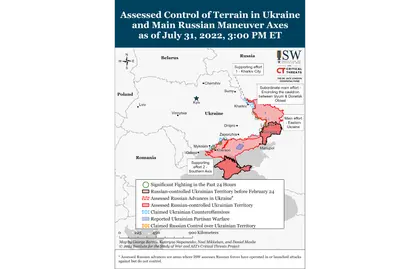Key Takeaways
- The Kremlin has not responded to the International Red Cross (ICRC) request to access the Olenivka prison as of July 31, hindering the international investigation efforts.
- Russian forces conducted limited ground attacks southwest and northwest of Izyum, consistent with ISW’s assessment that Russian forces may be setting conditions for advances northwest of the current Izyum-Slovyansk line.
- Russian forces continued ground attacks northwest of Slovyansk, northeast of Siversk, and to the east and south of Bakhmut.
- Russian forces made marginal gains in the Avdiivka area and continued ground attacks towards Avdiivka and Pisky.
- Russian authorities began recruiting volunteers for the Nevsky and Ladoga Battalions in Leningrad Oblast, Russia.
- Russian occupation authorities continued to prepare for a referendum in Kherson Oblast and took measures to depict support for Russian control of the occupied territories.
Russian forces have resumed localized ground attacks northwest and southwest of Izyum and may be setting conditions for offensive operations further west into Kharkiv Oblast or toward Kharkiv City. Russian forces have already launched unsuccessful assaults and reconnaissance-in-force attempts on Chepil, Shchurivka, and Husarivka (northwest of Izyum) and resumed assaults on Dmytrivka and Brazhikivka (southwest of Izyum) in recent days. Russian forces maintained positions around Balaklia and Velyka Komyshuvakha for months and may use these two areas as springboards for an offensive operation. Russian forces may use their positions around Balaklia to restart assaults on Kharkiv City from the southeast. Russian forces are extremely unlikely to seize Kharkiv Oblast or capture Kharkiv City – the second most populated city in Ukraine – given the pace of Russian progress in Donbas and continued challenges in force generation and logistics. ISW has previously assessed that Russian President Vladimir Putin may have ordered Russian forces to take Kharkiv City and the unoccupied portion of Kharkiv Oblast but that he is unlikely to be successful in such goals. Russian forces may also be conducting spoiling attacks to prevent Ukrainian counteroffensives.
JOIN US ON TELEGRAM
Follow our coverage of the war on the @Kyivpost_official.
Crimean occupation officials obliquely accused Ukraine of orchestrating a drone attack on the Russian Black Sea Fleet headquarters in occupied Sevastopol on July 31, but Ukrainian officials denied responsibility for the attack. Russian Governor of Sevastopol Mihail Razvozhaev claimed that Ukrainians “decided to spoil” Russia’s Navy Day celebrations and noted that a drone exploded in the headquarters’ yard but did not specify whether Ukrainian forces or locals launched the drone. Razvozhaev published images showcasing minor damage to the headquarters building and yard, and social media footage depicted a small cloud of smoke rising from the building. Razvozhaev also claimed that the explosion wounded six people. Russian Crimean Senator Olga Kovitidi later announced that unspecified actors carried out the attack with a makeshift drone from within the territory of Sevastopol. The Ukrainian Naval Forces and Odesa Oblast Military Administration Spokesman Serhiy Bratchuk indirectly suggested that the drone attack was a Russian false flag operation. ISW cannot independently verify the actor responsible for the attack.

Trump Comments Calling for Kremlin Concessions Ignites Firestorm of Russian Objections
The Russian government may be complicating international efforts to discern the nature of an unidentified July 28 kinetic event on the Olenivka penal colony. The Russian Ministry of Defense officially invited experts from the United Nations and the International Committee of the Red Cross (ICRC) to investigate the attack at the Olenivka prison on July 30. The ICRC stated that it has not received access to the prison as of July 31, however. Ukrainian Deputy Prime Minister Iryna Vereschuk also noted that Russian authorities have not responded to Ukrainian requests to return the bodies of deceased Ukrainian prisoners of war (POWs).
Open-source intelligence (OSINT) analyst Oliver Alexander published an examination of satellite imagery from July 27 showing open graves at the Olenivka prison, noting that July 29 satellite imagery appears to show that the same graves have been covered. Investigative journalism group Bellingcat founder Eliot Higgins stated that lower resolution satellite imagery indicates ground disturbances after July 18 and prior to July 21, suggesting that the Russians may have planned the incident in advance. ISW will continue to monitor the open source for information on the strike on Olenivka and will provide updates as they appear.
Written by: Kateryna Stepanenko, Layne Philipson, Karolina Hird, and Frederick W. Kagan.
See full report here.
You can also highlight the text and press Ctrl + Enter










